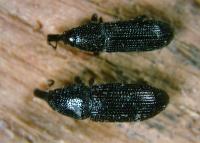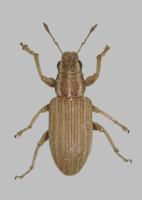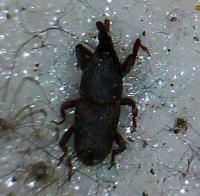Wood weevils Pentarthrum huttoni and Euophryum confine
Adult insects
Size: 2-4mm
Shape: narrow, cylindrical
Colour: black
Antennae: short, with a distinctive crank ("L" shape) and a club on the end.
Distinguishing features: The head has a distinct snout, called a rostrum, with the jaws on the end. The antennae of all weevils have a distinct crank ("L" shape) half way along. See photos.
Larvae eat: very damp wood
Damage is: tunnels in wood, grooves on the surface and small (1-1.5mm) exit holes. The frass is fine but gritty.
Adults eat: The surface of the wood by grazing.
Other info: The two main species of wood weevils are extremely difficult to tell apart. The weevil at the top of the photo is Euophryum and the one below is Pentarthrum. As both have very similar life cycles and food requirements accurate identification to species is not essential. Presence of wood weevils in numbers is a sure sign that there are quantities of damp wood.
Wood weevils are much smaller than the related grain weevils and rice weevils, (Sitophilus), which infest whole grain.
Size: 2-4mm
Shape: narrow, cylindrical
Colour: black
Antennae: short, with a distinctive crank ("L" shape) and a club on the end.
Distinguishing features: The head has a distinct snout, called a rostrum, with the jaws on the end. The antennae of all weevils have a distinct crank ("L" shape) half way along. See photos.
Larvae eat: very damp wood
Damage is: tunnels in wood, grooves on the surface and small (1-1.5mm) exit holes. The frass is fine but gritty.
Adults eat: The surface of the wood by grazing.
Other info: The two main species of wood weevils are extremely difficult to tell apart. The weevil at the top of the photo is Euophryum and the one below is Pentarthrum. As both have very similar life cycles and food requirements accurate identification to species is not essential. Presence of wood weevils in numbers is a sure sign that there are quantities of damp wood.
Wood weevils are much smaller than the related grain weevils and rice weevils, (Sitophilus), which infest whole grain.



Wood weevils Pentarthrum huttoni and Euophryum confine
100%





